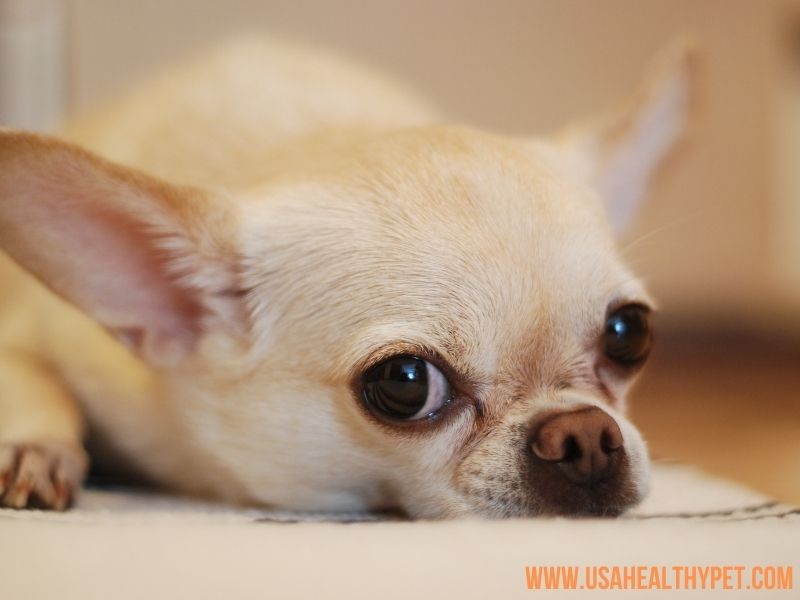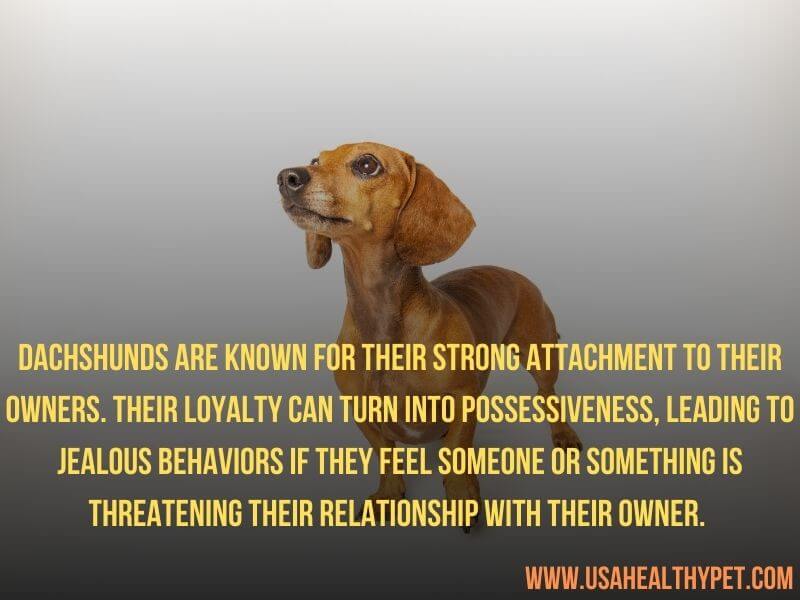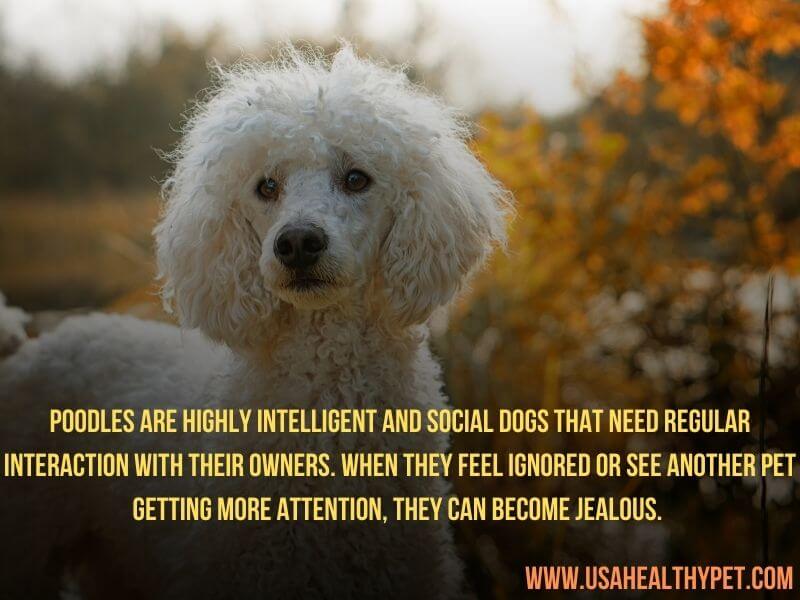Dogs are known for their loyalty and affection, but sometimes these qualities can lead to less desirable behaviors, such as jealousy.
Like humans, dogs can experience jealousy when they feel threatened by a perceived rival, whether it’s another pet, a new family member, or even a favorite toy.
Some dog breeds are more prone to jealousy than others, often due to their unique temperaments and the strong bonds they form with their owners.
In this article, we’ll explore the top 15 dog breeds known for their jealous tendencies, discuss the causes of dog jealousy, and offer practical tips on how to manage these behaviors.
Top 15 Most Jealous Dog Breeds
1. Chihuahua

Chihuahuas are tiny dogs with big personalities. Known for their fierce loyalty to their owners, Chihuahuas often become jealous when they feel their bond is threatened.
Their small size makes them feel vulnerable, so they may act out by barking excessively or becoming possessive.
According to Dr. Stanley Coren, the author of “The Intelligence of Dogs,” small breeds like Chihuahuas often display jealousy because they rely heavily on their owners for security and comfort.
2. French Bulldog

French Bulldogs are affectionate and love being the center of attention. Their desire for human interaction can lead to jealousy, especially if they feel overlooked in favor of another pet or person.
They may display their jealousy by being clingy or trying to push themselves between you and the perceived rival.
3. German Shepherd
German Shepherds are protective by nature, which can sometimes translate into jealousy.
Their strong guarding instincts make them wary of anything that could take attention away from them, such as new pets or people. This jealousy can manifest as aggression or overly watchful behavior.

4. Cocker Spaniel
Cocker Spaniels are highly emotional and sensitive dogs. They crave affection and can become jealous if they feel they’re not getting enough attention.
Their jealousy often shows up as sulking or whining, especially when they see their owners giving attention to others.
According to research published in the journal Animal Cognition, dogs, particularly those with sensitive temperaments, can exhibit jealousy similar to that seen in human toddlers when their social bonds are threatened.

5. Border Collie
Border Collies are incredibly intelligent and need constant mental stimulation. They can become jealous if they don’t get the attention and activity they need.
This jealousy may surface as destructive behavior or an intense focus on their owners, demanding constant interaction.
6. Dachshund
Dachshunds are known for their strong attachment to their owners. Their loyalty can turn into possessiveness, leading to jealous behaviors if they feel someone or something is threatening their relationship with their owner.
They might become territorial, especially around other dogs.
Dr. Bonnie Beaver, a professor of veterinary medicine, points out that Dachshunds, due to their history as hunters and their close bond with owners, may be particularly prone to jealousy when other pets invade their territory.

7. Labrador Retriever
Labrador Retrievers are one of the most affectionate dog breeds, and they thrive on human interaction.
However, this desire for attention can lead to jealousy if they feel neglected. Labs may show their jealousy by trying to dominate the attention of their owners, often by nudging or pawing at them.
8. Golden Retriever
Golden Retrievers are friendly and sociable, but they don’t like being left out. Their jealousy often arises when they see their owners paying attention to someone else, whether it’s another pet or a person.
This can result in attention-seeking behaviors like bringing toys to you or barking.
9. Poodle
Poodles are highly intelligent and social dogs that need regular interaction with their owners. When they feel ignored or see another pet getting more attention, they can become jealous.
This jealousy might be expressed through sulking or acting out to get your attention.

10. Rottweiler
Rottweilers have strong guarding instincts and are very loyal to their families.
These traits can sometimes lead to jealousy, especially if they perceive a new pet or person as a threat to their bond with their owner. Jealous Rottweilers may become protective or even aggressive.
11. Beagle
Beagles are pack animals, and they thrive in social environments. However, in multi-dog households, they can become jealous if they feel another dog is getting more attention or food.
Their jealousy often shows up as whining, howling, or even trying to steal food or toys from others.
Dr. McGreevy explains that Beagles’ pack-oriented nature can make them sensitive to perceived favoritism, leading to jealous behaviors if they feel sidelined.
12. Yorkshire Terrier
Yorkshire Terriers, or Yorkies, have bold personalities and can be quite possessive of their owners.
They’re known to become jealous of other pets, often displaying their jealousy through aggressive barking or by trying to dominate the other pet.
13. Shih Tzu
Shih Tzus are companion dogs that love being pampered.
They can become very jealous if they feel another pet is receiving more attention, and this jealousy often shows up as sulking or refusing to engage with their owners.

14. Australian Shepherd
Australian Shepherds are energetic and intelligent, requiring a lot of mental and physical stimulation.
If they don’t get enough attention or exercise, they can become jealous, often showing this by being overly clingy or engaging in destructive behavior.
15. Jack Russell Terrier
Jack Russell Terriers are known for their independence, but they also form strong bonds with their owners.
When they feel those bonds are threatened, they can become jealous, displaying behaviors like barking, nipping, or trying to assert dominance over the perceived rival.
Dr. Horowitz notes that despite their independent nature, Jack Russells can exhibit strong jealous behaviors when their close relationships with their owners are disrupted.
Causes of Dog Jealousy
A variety of factors can trigger jealousy in dogs. Understanding these causes can help you better manage and prevent jealous behaviors in your dog.
Environmental Factors
Changes in the household, such as the introduction of a new pet, baby, or partner, can trigger jealousy in dogs.
They may feel that their position in the family hierarchy is being threatened, leading to possessive or aggressive behavior.
Owner Behavior
Dogs are highly perceptive and can pick up on their owner’s behavior. If an owner shows favoritism towards another pet or gives inconsistent attention, it can lead to jealousy.
This is especially true for breeds that are highly attuned to their owner’s emotions.
Breed-Specific Traits
Certain breeds are naturally more prone to jealousy due to their temperament and instincts.
For example, dogs with strong guarding instincts, like Rottweilers and German Shepherds, may be more likely to exhibit jealous behavior if they feel their family is being threatened.
Signs of Jealousy in Dogs
It’s important to recognize the signs of jealousy in your dog so you can address the issue before it escalates. Here are some common signs to watch for:
- Attention-Seeking Behavior: Your dog may try to push themselves between you and another pet or person, or constantly demand your attention.
- Possessiveness: This can include guarding toys, food, or even you from other pets or people.
- Aggression: Jealousy can lead to aggressive behavior, such as growling, snapping, or barking at the perceived rival.
- Excessive Barking or Whining: Dogs may vocalize their jealousy through persistent barking or whining.
- Destructive Behavior: Some dogs may act out by chewing on furniture, shoes, or other objects when they’re feeling jealous.
Research has shown that dogs can experience jealousy similar to humans. A study published in the journal PLOS One found that dogs exhibited jealous behaviors when their owners interacted with what appeared to be another dog, suggesting that jealousy is rooted in social bonding.
How to Manage Jealous Dog Behaviors
If your dog is showing signs of jealousy, it’s important to address the behavior early on. Here are some strategies to help manage and reduce jealousy in dogs:
Training Techniques
Positive reinforcement is one of the most effective ways to manage jealousy.
Reward your dog for calm behavior when they’re around other pets or people. Training them to associate the presence of others with positive experiences can help reduce jealous tendencies.
Environmental Changes
Ensure that all pets receive equal attention and have their own space.
Creating separate feeding areas, sleeping spaces, and play zones can help reduce competition and jealousy among pets. If you introduce a new pet or person to the household, do so gradually to give your dog time to adjust.
When to Seek Professional Help
If your dog’s jealousy is persistent or leads to aggressive behavior, it may be time to consult a professional.
A certified dog behaviorist or trainer can help you develop a plan to manage and reduce your dog’s jealous behaviors. In some cases, underlying anxiety or insecurity may be contributing to the jealousy, which a professional can help address.
Conclusion
Jealousy in dogs is a common behavior, especially in breeds that are highly loyal and protective. By understanding the causes and signs of jealousy, dog owners can take steps to manage and reduce these behaviors.
With the right training, environment, and attention, it’s possible to help your dog feel secure and reduce their need to compete for your affection.
If you’re struggling with a jealous dog, don’t hesitate to seek professional help to ensure the well-being of your pet and your household.
FAQs
1. What is the most jealous dog breed?
Chihuahuas are often considered one of the most jealous dog breeds due to their strong attachment to their owners and their tendency to become possessive.
2. Can jealousy in dogs be dangerous?
Yes, jealousy in dogs can lead to aggressive behavior if not managed properly. It’s important to address jealousy early on to prevent it from escalating.
3. How can I tell if my dog is jealous?
Signs of jealousy in dogs include attention-seeking behavior, possessiveness, aggression, excessive barking, and destructive behavior.
4. Are there any breeds that are less likely to be jealous?
Breeds known for being more independent or less emotionally attached to their owners, such as the Basenji or Afghan Hound, may be less prone to jealousy.
5. What should I do if my dog’s jealousy is getting worse?
If your dog’s jealousy is worsening or leading to aggressive behavior, it’s important to consult a professional dog behaviorist or trainer for guidance.

Pingback: Calupoh Dog Breed: Characteristics, History, and Care Tips
Pingback: Barrel-Chested Dog Breeds: Health, Care, and Best Breeds
Pingback: Top 5 Dog Breeds with Zig-Zag on Tail: Key Traits and Care
Pingback: Weimaraner Pitbull Mix: The Ultimate Guide to This Breed
Pingback: Top Dog Breeds with Widow’s Peak: A Guide to Unique Looks
Comment:
Thanks for sharing such a comprehensive article on jealousy in dogs!
It’s fascinating to see how breed-specific traits and environmental factors can contribute to this
behavior. I had no idea that certain breeds, like Chihuahuas and French
Bulldogs, were more prone to jealousy. It’s also interesting to learn about the causes and
signs of jealousy in dogs, and the practical tips provided for managing these behaviors are very helpful.
I’ll definitely be keeping an eye out for these signs in my own pets and will use the suggested strategies to ensure
they feel secure and loved. Thanks again for sharing this
insightful information!